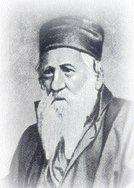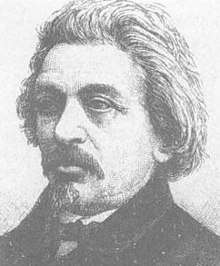Proto-Zionism
Proto-Zionism (or Forerunner of Zionism; Hebrew: מְבַשְרֵי הציונות, pronounced: Mevasrei ha-Tzionut) is a term attributed to the ideas of a group of men deeply affected by the idea of modern nationalism spread in Europe in the 19th century as they sought to establish a Jewish homeland in the Land of Israel. The central activity of these men was between the years 1860 to 1874, before the Zionist movement established practical (1881) and political Zionism (1896). It is for this reason that they are called precursors of Zionism, or proto-Zionists.

But while the 17th century raised the overall idea of "restoring the Jews to Israel naturally by settlement and political action" [1] by Jews and non-Jews, ideas therein in terms of an ultimate goal were missing. These ideas also did not unite people to action and relied on the national project and the State (the Jewish nation). Therefore, the figures behind these ideas are not considered as Heralds of Zionism.
This group of men considered as proto-Zionists includes Rabbi Judah Bibas (1789-1852), Rabbi Judah ben Solomon Hai Alkalai (1798–1878), Rabbi Zvi Hirsch Kalischer (1795–1874), and philosopher Moses Hess (1812–1875).
History
According to Ben-Zion Dinur, the aliyah of Judah HeHasid and his group opened a new era which began to develop processes such as encouraging productivity, the revival of the Hebrew language and national aspirations. Nahum Sokolow described proto-Zionists as anyone who wished to renew the Jewish community in the Land of Israel, or who wrote about the Jewish problem, starting from the 17th century. This broad definition included such figures as Moses Montefiore, Adolphe Crémieux, Eliezer Ben-Yehuda and Sabbatai Zevi. Nathan Michael Gerber also traced the forerunners of Zionism back to the 17th century.
According to Dov Weinereve, the first "forerunner" is Mordecai Manuel Noah.
Jacob Katz argued that it is possible to point out only on three men as "forerunners of Zionism": Rabbi Judah ben Solomon Hai Alkalai, Rabbi Zvi Hirsch Kalischer, a thinker Moses Hess, since although other people acted in various forms, it is just these three's actions that left the imprint on the Hovevei Zion. Samuel Leib Zitron cited Rabbi Alkalai as the pioneer of modern political Zionism.
Citron and Samuel Ettinger, who argued that even if preceded by the movement of Hovevei Zion were different personalities who tackled the Jewish problem, the few acts that they were at hand to do did not leave an impression for generations, did not affect anything on the Zionist movement, and thus there is no person that could be called "harbinger of Zionism".
Zionism precursors
- Judah Bibas was a Gibraltar-born Rabbi, who served as the Chief Rabbi of Corfu. Bibas made visits in Jewish Communities over Europe, and encourage Jews to make Aliyah to Palestine.
- Moses Hess was influenced by the idea of modern nationalism and subsequently published in 1862 his Rome and Jerusalem. Hess, who was a former revolutionary socialist and secular, rediscovered cultural and political origins of Judaism, all in order to draw out ideas for the modern Jewish national movement.
- Yehuda Alkalai was a Spanish rabbi from the Balkans and student of Rabbi Yehuda Bibas, was infused with Christian ideas about the end of redemption, was deeply influenced by the political success of Adolphe Crémieux and Moses Montefiore and the Damascus affair, in 1840.
- Zvi Hirsch Kalischer was a German of Polish origin who saw emancipation - equal rights has been applied, at least practically, even on Jews - as part of the process of redemption.
Katz argues that the rabbis Alkalai and Kalisher changed their religious worldview, abandoning the "Basics of non - realistic perception of traditional Messianic views".[2]
He also explains that during their actions as forerunners of Zionism there "was not on the agenda an issue of lack of rights to Jews or social discrimination" [2] and thus the modern idea of Jewish nationalism was not a success in the years they operated. From the late '70s, with growing economic plight of Eastern European Jews and the rising wave of anti-Semitism, two and a half million Jews left Eastern Europe (until World War I), while only a small percentage of them emigrated to Israel.
References
- Jacob Katz, "Jewish nationality", Hasifriya ha-Tzionit, Jerusalem, 1983
- Jacob Katz, "התנועה היהודית הלאומית: ניתוח סוציולוגי", Jerusalem, 1980

